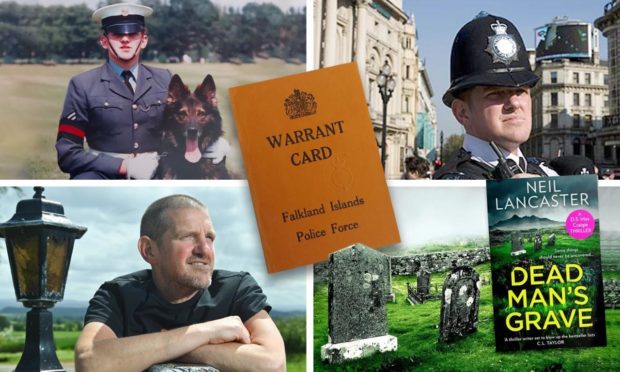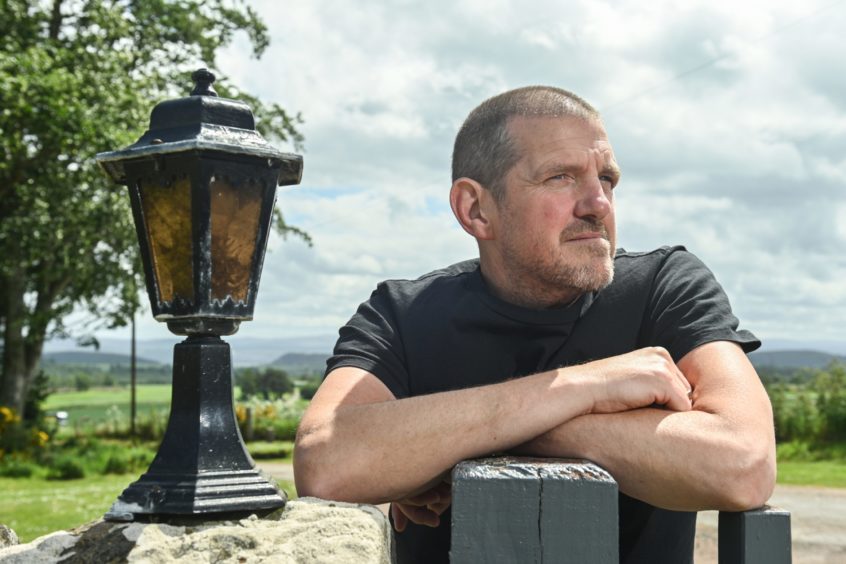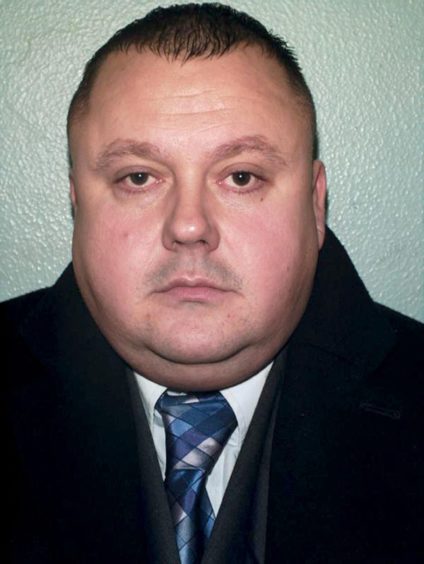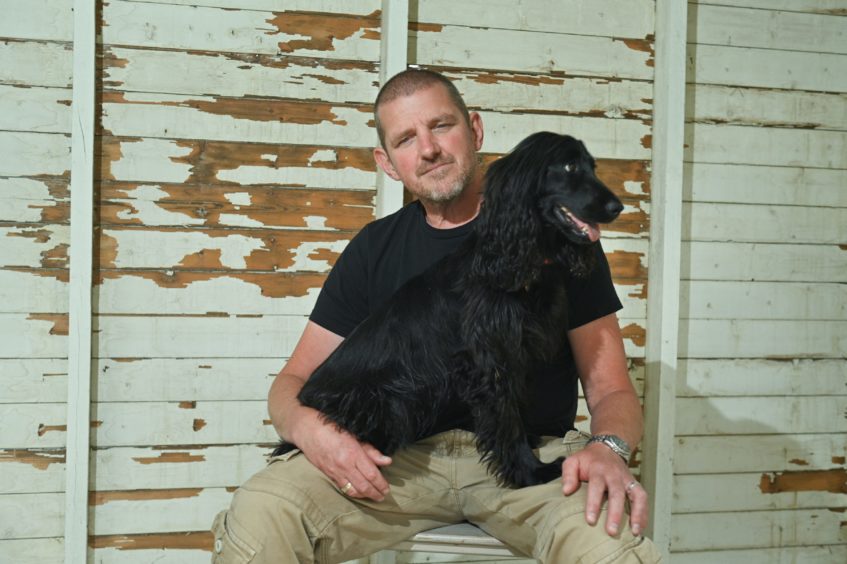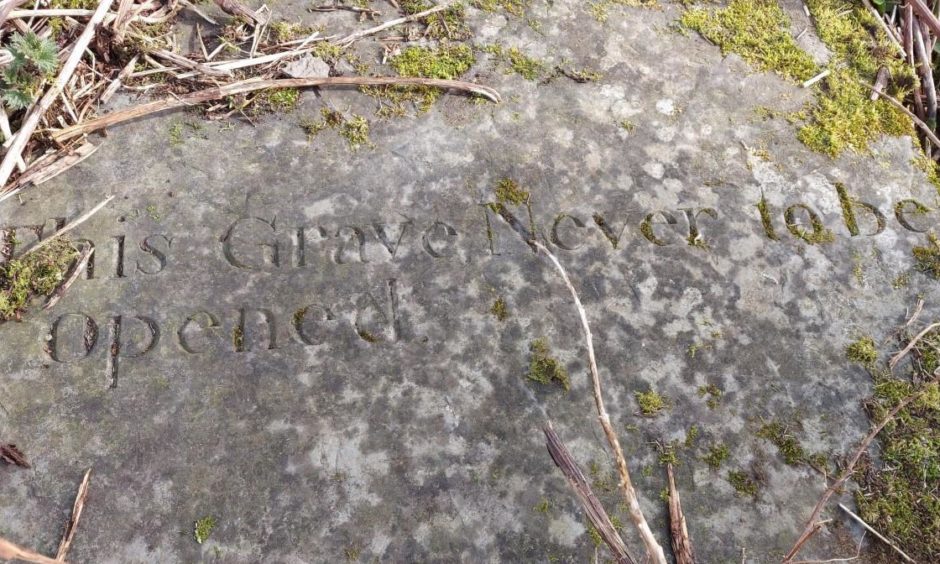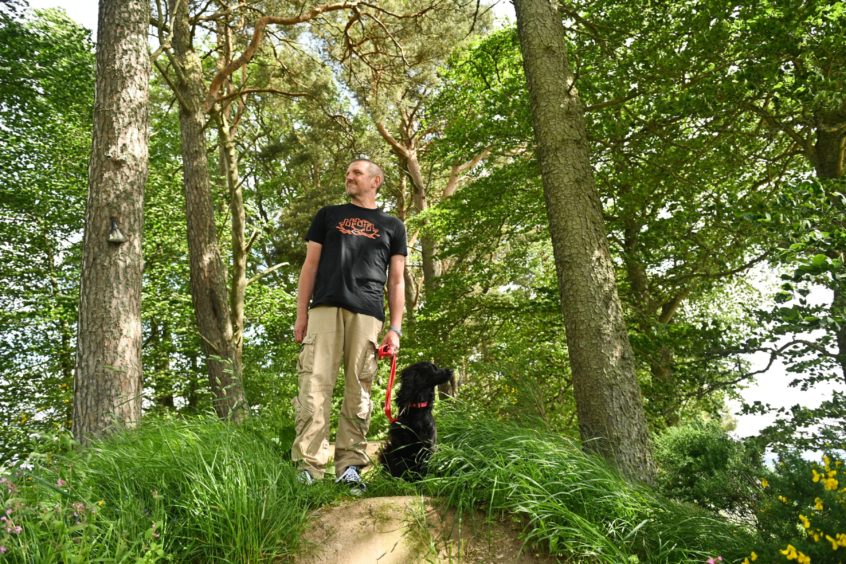It was a chance remark from one former policeman to another over Christmas drinks, but it sparked Neil Lancaster’s imagination.
The ex-Metropolitan Police officer, who relocated to the Black Isle and became a successful crime author, was chatting to his friend’s father, John Fisher in 2019, when the latter suddenly came up with a novel suggestion.
He mentioned the day he had been researching the ancestry of his wife’s family in the Highlands and visited an ancient graveyard in the wilds.
And then he explained how he had scraped away a bundle of moss and weeds from a flat stone on the ground and found that the burial place was simply inscribed with the words: “This Grave Never To Be Opened”.
As Lancaster recalled: “Well, that just knocked me for six. What a start. What a way to grab readers’ attention. I just had to write a book inspired by this”.
And he has done so to such effect that Dead Man’s Grave is now in contention for a prestigious award even before the book is published next month.
But, for the moment, let’s go back to unravelling this fellow’s remarkable story from the days when he was almost consumed by his work in tracking down humans capable of committing the most horrible crimes.
The murders which sparked revulsion
Mr Lancaster chased killers, human traffickers, fraudsters and drug dealers during more than 30 years of his life in the police and the military and all the way from Britain to the Falkland Islands.
But he has never met a worse human being than Levi Bellfield, the serial killer, who murdered Milly Dowler, Marsha McDonnell and Amelie Delagrange, and is now behind bars for the rest of his life.
Mr Lancaster, a surveillance expert, travelled from St Albans into London nearly every day for 25 years but grew thoroughly “sick of it”.
However, the move to the Scottish Highlands, on the edge of a forest, just 10 minutes from a beach, has revived and inspired him to enter the literary world and gain praise from the likes of Ian Rankin, Lin Anderson and Tony Parsons.
Not that he will ever forget being part of the team who were absolutely committed to bringing Bellfield to justice.
He said: “I was part of the team effort of keeping him under surveillance in the run-up to his arrest. This was perfectly represented in the ITV dramatization of the case, Manhunt, which was based on the book of the senior investigating officer, Colin Sutton.
“Levi Bellfield was a case that really took over my life for short period of time. It was all consuming being asked to be part of a surveillance team to watch the most dangerous man in the country to ensure he didn’t offend again.
“The stakes were so high that it was overwhelming, because the consequences of failure were unthinkable. A surveillance team is always more than the sum of its parts, and it is only as strong as the weakest link in the chain.
“One loss of concentration, one person not doing their job properly and he could have been gone. And free to strike again.
“Levi Bellfield was one case where there was no golden nugget.
“No one key piece of evidence that nailed him, rather it was a whole collection of small pieces of evidence that, taken together, made for a strong case.”
Moving from hard fact to fiction
Mr Lancaster recognises there is little, if any, connection between the world of Eureka-style detection as portrayed in the likes of CSI: Miami, Broadchurch or Line of Duty and the meticulous, painstaking and often tedious task of bringing myriad disparate strands together during a criminal investigation.
Yet he has successfully adapted from toiling assiduously behind the scenes to appearing in the spotlight at festivals across Britain, following the publication of a trilogy of novels, Going Dark, Going Rogue and Going Back.
And his relocation to Scotland has clearly transformed him and acted as the catalyst for his entry to an entirely new world.
He said: “My job as a DS on an organised crime team was rewarding and sometimes exciting, but it was also very stressful and it was getting more and more wearing as time went on, especially with the daily commute.
A breath of Highland fresh air
“We had been visiting the Black Isle for a few years, because I have family who live in the area, and we had fallen in love with the peace and quiet, the clean air and the easy access to the great outdoors.
“Then, when my police retirement date was looming, we spotted a nice looking house for sale and we just couldn’t believe that, for quite a bit less than our small, semi-detached house in St Albans was worth, we could have a spacious house with a huge garden and views all the way to the Cairngorms.
“It was just a no-brainer and I feel so thankful that I moved to Scotland.”
As does the large readership which he has attracted in the last three years.
Searching for a grave in Caithness
John Fisher’s reminiscences about the remote grave with the ominous message piqued Mr Lancaster’s interest and he was determined to learn more about the story.
But it was no easy feat to pinpoint the ancient burial site, and especially as the Covid pandemic struck Britain and the rest of the world early in 2020.
He said: “Firstly, I wanted to find out where this graveyard was, because John’s descriptions of it were sketchy to say the least.
“There was surprisingly few mentions of it, but I soon became certain that the graveyard was at a place just outside Latheron in Caithness.
My online research led me to believe that it was at a place called Ballachly, close to Loch Stemster and in the middle of the Munsary Peatlands.
“There were some records of an ancient chapel next to a an ancient Broch which had collapsed years ago, leaving just a small, walled burial ground.
“Having found it, I was desperate to visit it. But then, the world shifted on its axis and coronavirus changed everything. We were locked down.”
The deil’s awa’ with the exciseman
However, as somebody with the philosophy that genius is an infinite capacity for taking pains, he refused to let adversity become an immovable obstacle.
He added: “Whilst I couldn’t travel to visit the graveyard, I still had my imagination so I could still write. So, write I did.
“Once lockdown was eased, I visited the graveyard, which was an amazing experience. To say it is remote is an understatement.
“It was at least an hour’s walk from the nearest car parking area in the middle of a huge field. I just couldn’t get my head around what it must have looked like all those years ago when the chapel was also there.
“It was wildly overgrown and only a few of the stones remained standing. The Grave Never to Be Opened, was just so eerie that it actually gave me goose bumps. It was an amazing day, and an incredible place to visit.
Robert Burns even entered the story
“I wanted to base the ancient feud on the old whisky wars that were common at that time, with the constant battles of the British government to stop the many illegal whisky stills that were common at that time.
“I found myself transfixed by the many stories of excisemen – or gaugers – closing down stills, or trying to impose taxes on farmers who were trying to turn barley into whisky.
“When I learned that Robert Burns had, for a short time, been a rather unsuccessful exciseman, my fascination soared. I spoke with a friend, author and historian Verity Walker and learned a little more about excisemen of the period to put in the book to add to the authenticity.
“Many Gaugers had been in the Navy, which changed the story in a small, but vital way. How much more Scottish could I make this book if the background was steeped in Scottish history, and I even had a poem I could include?
“The deil’s awa the deil’s awa,
“The deil’s awa wi’ the Exciseman,
“He’s danc’d awa he’s danc’d awa
“He’s danc’d awa wi’ the Exciseman.”
Life has changed in a good way
Mr Lancaster still wakes up sometimes and admits he can barely believe he is being rewarded for writing and living in such a beautiful part of the world.
But there’s a breathless enthusiasm to all his endeavours which helps you understand why he has become such a success in his new milieu.
He said: “When I look back on how my life has changed over the past six years, I really have a difficulty believing where I am now.
“I used to get up at six every morning and commute ninety minutes into London on a packed commuter train. My days were long, stressful and draining building criminal cases against serious criminals.
“My life was dominated by, and defined by, policing the capital. It was unrelenting, it was hard and sometimes it could be overwhelming. I’d wake up in the middle of the night gripped by what I had to do, what I hadn’t done, and how a simple mistake could derail a million-pound criminal case.
“Don’t get me wrong, I loved my career as a police officer, and I am still proud of what I achieved, but when I walked away from the office at London Bridge in the summer of 2015, I breathed an enormous sigh of relief and felt as if a ton weight had been lifted from my shoulders.
“My life now couldn’t be more different. I get up and take my son to the school bus, I walk Peggy the cocker spaniel [who is a hit with the local refuse collectors], I paddle board, I mountain bike and I get to dream up stories.
“I pinch myself every day when I look out of the window, across the sweeping Black Isle scenery all the way to the Cairngorms and think: ‘I live here.’
“Being an author was always a dream I hid away in the recesses of my mind and I suppose I just needed the time and the impetus to do it. But I am not sure I will ever get used to it.”
His peers seem to have no such doubts.
Neil is in stellar company on longlist
Mr Lancaster was announced this week among the contenders for the 2021 McIlvanney Prize, named after the acclaimed Scottish writer William McIlvanney, who created the ground-breaking Laidlaw detective stories.
This year sees the publication of his final book, The Dark Remains which was completed with the help of his distinguished compatriot Ian Rankin.
Dead Man’s Grave features in the list, which also includes works by such luminaries as Chris Brookmyre, Val McDermid, Denise Mina, William McIntyre and Stuart MacBride.
Mr Lancaster is thrilled at the news, but has one regret: and that’s the fact his friend John Fisher died before the new book was finished.
He said: Sadly, John passed away on his birthday, on January 24 2021, so he never had the opportunity to read it.
“But his son in Australia had told him all about his part in the book being born, and that the book is dedicated to him.
“So John, this is for you.”
